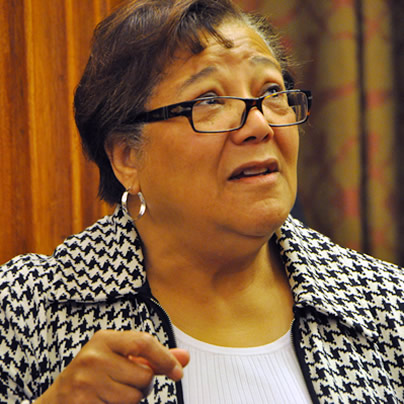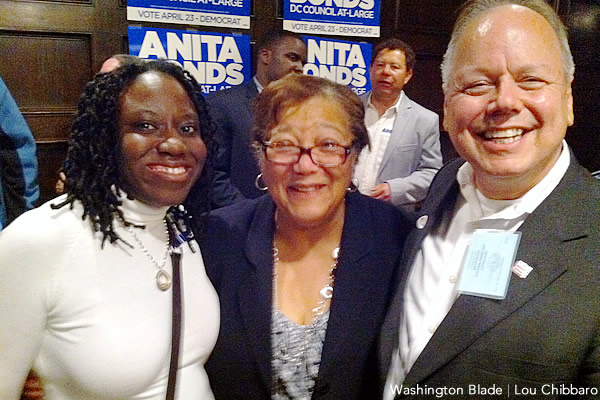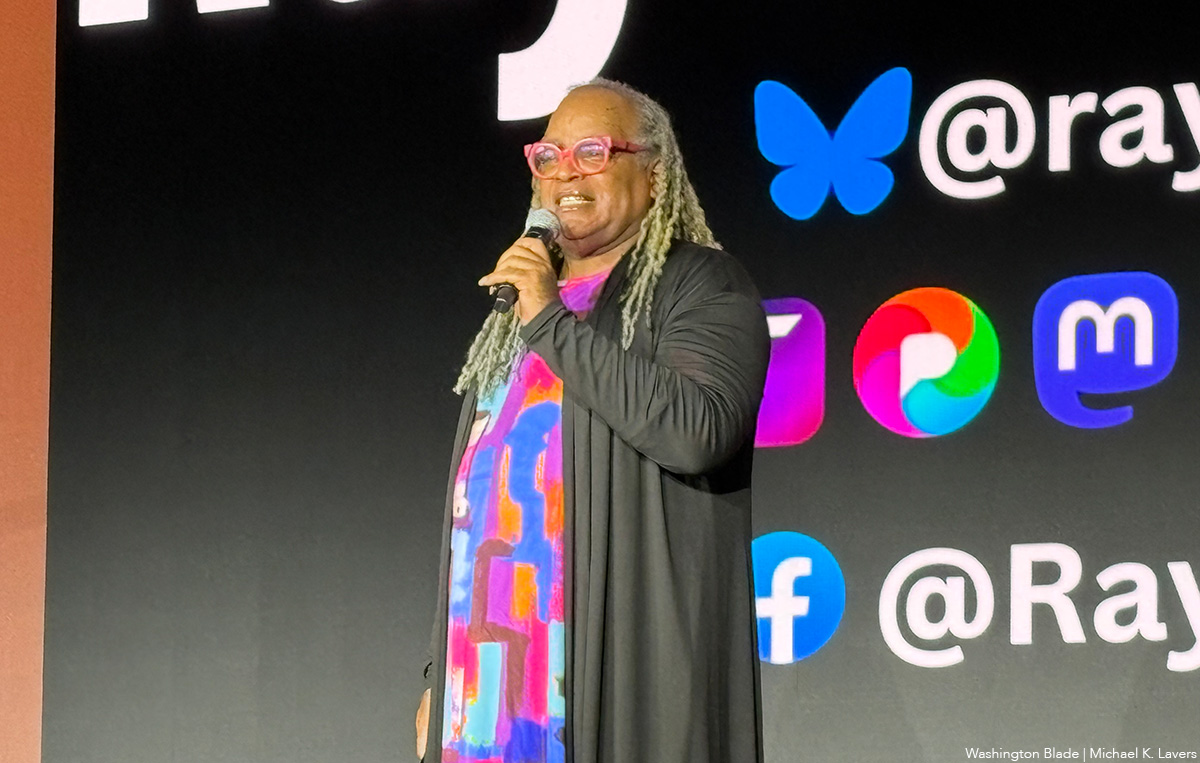Local
Bonds wins D.C. Council race
Silverman takes ‘gay’ precincts in special election


‘I know I have many friends in the LGBT community for which I am blessed,’ Anita Bonds (center) told the Blade after her win on Tuesday. Bonds pictured here with Lateefah Williams (left) and Bill O’Field. (Washington Blade photo by Lou Chibbaro)
Incumbent Democrat Anita Bonds won the race for an at-large seat on the D.C. Council in the city’s special election on Tuesday, beating five rivals, including pro-gay Republican Patrick Mara, who drew support from LGBT activists.
But Democratic candidate Elissa Silverman, who came in second place citywide, won in 12 of the city’s 14 precincts identified as having high concentrations of LGBT residents. Mara came in second in the same 12 precincts, with Bonds coming in third.
Bonds won by a wide margin in the two remaining “gay” precincts, one in Anacostia and the other along the Southwest waterfront area, where large numbers of black LGBT residents live.
“I know I have many friends in the LGBT community for which I am blessed,” Bonds told the Blade after delivering her victory speech at the Channel Inn Hotel located on the Southwest waterfront.
“I don’t know how they all voted, but when we look at the data we’ll probably discover that persons who have been members of the community 15 to 20 years, they knew Anita,” she said. “Those who are relatively new to D.C., many didn’t know me or know my record.”
David Meadows, former president of the Gertrude Stein Democratic Club, the city’s largest LGBT political group, serves as press secretary for Bonds’ Council office. He noted that Bonds became a member of the Stein Club as a straight ally in 1978, two years after the club was founded, and has been a strong LGBT rights supporter ever since.
“I wouldn’t say it was overwhelming,” Meadows said in describing Bonds’ support among LGBT voters in Tuesday’s election. “But I think that there were many long-term LGBT residents that understood the support that Anita Bonds brought to our community.”
In the citywide race, Bonds received 32 percent of the vote, with Silverman receiving 28 percent. Mara received 23 percent. Democratic candidates Matthew Frumin and Paul Zuckerberg received 11 percent 2 percent respectively. Statehood Green Party candidate Perry Redd also received 2 percent.
As predicted by many political observers, only about 10 percent of the city’s registered voters turned out to vote in the special election, appearing to be one of the lowest turnout elections ever in D.C.
Each of the candidates expressed strong support for LGBT rights, including backing for the city’s same-sex marriage law. Bonds and Silverman drew support from many of the city’s prominent LGBT activists.
Mara also drew support from some of the city’s prominent gay Democratic activists, raising speculation that he could win the race as a reform candidate appealing to Democratic voters, both gay and straight, who yearn for a fresh face on the Council.
But Silverman appears to have won over a majority of the voters that political pundits say Mara attracted in his two previous races for a City Council seat.
Silverman came in first in Wards 1 and 6, where large numbers of LGBT voters live. Mara won in Ward 2, which also has large numbers of LGBT residents, and in Ward 3, where the majority of the city’s registered Republicans reside. Silverman’s win over Mara in Ward 1 came as a surprise to some because Mara, a Ward 1 resident, won election last year to the Ward 1 seat on the city’s Board of Education.
Bonds won by wide margins in the majority black Wards 4, 5, 7 and 8.
Silverman received the most votes among members of the Gertrude Stein Club at an endorsement meeting in March. But she fell five points short of the 60 percent majority vote required for a Stein Club endorsement. Bonds came in second place in the endorsement vote.
Individual Stein Club members appeared to be evenly divided in their backing between Silverman and Bonds.
LGBT activists familiar with city voting trends caution that the so-called “LGBT” precincts may not be representative of all LGBT voters because most of them are in majority white sections of the city. Gay Democratic activist Phil Pannell, a longtime resident of Ward 8, has said black LGBT residents tend to be dispersed in many different precincts and tend not to be concentrated in a few specific precincts such as those in Dupont Circle, Logan Circle and Adams Morgan.
Following is the breakdown of the vote between the leading three candidates in voter precincts identified as having high concentrations of LGBT residents. Percentages are rounded:
- Precinct 14 (Dupont Circle): Silverman, 44 percent; Mara, 37 percent; Bonds, 6 percent
- Precinct 15 (Dupont Circle): Silverman, 43 percent; Mara, 39 percent; Bonds, 11 percent
- Precinct 16 (Logan Circle): Silverman, 46 percent; Mara, 32 percent; Bonds, 11 percent
- Precinct 17 (Logan Circle): Silverman, 36 percent; Mara, 34 percent; Bonds, 15 percent
- Precinct 18 (Shaw): Silverman, 40 percent; Mara, 18 percent; Bonds 24 percent
- Precinct 22 (14th & U Street, N.W. corridor): Silverman, 45 percent; Mara 31 percent; Bonds, 13 percent
- Precinct 23 (U Street & Columbia Heights): Silverman, 48 percent; Mara, 21 percent; Bonds, 17 percent
- Precinct 24 (Adams Morgan): Silverman 51 percent; Mara 20 percent; Bonds, 13 percent
- Precinct 25 (Adams Morgan): Silverman, 41 percent; Mara, 34 percent; Bonds, 8 percent
- Precinct 36 (Columbia Heights): Silverman, 45 percent; Mara, 36 percent; Bonds 20 percent
- Precinct 89 (Capitol Hill): Silverman 50 percent; Mara, 36 percent; Bonds, 4 percent
- Precinct 90 (Capitol Hill): Silverman, 47 percent; Mara, 36 percent; Bonds, 6 percent
- Precinct 112 (Anacostia): Silverman, 5 percent; Mara, 4 percent; Bonds, 78 percent
- Precinct 127 (Southwest Waterfront): Silverman, 29 percent; Mara 20 percent; Bonds, 39 percent
Virginia
McPike wins special election for Va. House of Delegates
Gay Alexandria City Council member becomes 8th LGBTQ member of legislature

Gay Alexandria City Council member Kirk McPike emerged as the decisive winner in a Feb. 10 special election for a seat in the Virginia House of Delegates representing Alexandria.
McPike, a Democrat, received 81.5 percent of the vote in his race against Republican Mason Butler, according to the local publication ALX Now.
He first won election to the Alexandria Council in 2021. He will be filling the House of Delegates seat being vacated by Del. Elizabeth Bennett-Parker (D-Alexandria), who won in another Feb. 10 special election for the Virginia State Senate seat being vacated by gay Sen. Adam Ebbin (D-Alexandria).
Ebbin is resigning from his Senate next week to take a position with Virginia Gov. Abigail Spanberger’s administration.
Upon taking his 5th District seat in the House of Delegate, McPike will become the eighth out LGBTQ member of the Virginia General Assembly. Among those he will be joining is Sen. Danica Roem (D-Manassas), who became the Virginia Legislature’s first transgender member when she won election to the House of Delegates in 2017 before being elected to the Senate in 2023.
“I look forward to continuing to work to address our housing crisis, the challenge of climate change, and the damaging impacts of the Trump administration on the immigrant families, LGBTQ+ Virginians, and federal employees who call Alexandria home,” McPike said in a statement after winning the Democratic nomination for the seat in a special primary held on Jan. 20.
McPike, a longtime LGBTQ rights advocate, has served for the past 13 years as chief of staff for gay U.S. Rep. Mark Takano (D-Calif.) and has remained in that position during his tenure on the Alexandria Council. He said he will resign from that position before taking office in the House of Delegates.
Local
Local LGBTQ groups, activists to commemorate Black History Month
Rayceen Pendarvis to moderate Dupont Underground panel on Sunday

LGBTQ groups in D.C. and elsewhere plan to use Black History Month as an opportunity to commemorate and celebrate Black lives and experiences.
Team Rayceen Productions has no specific events planned, but co-founder Rayceen Pendarvis will attend many functions around D.C. this month.
Pendarvis, a longtime voice in the LGBTQ community in D.C. moderated a panel at Dupont Underground on Feb. 8. The event, “Every (Body) Wants to Be a Showgirl,” will feature art from Black burlesque artists from around the country. Pendarvis on Feb. 23 will attend the showing of multimedia play at the Lincoln Theatre that commemorates the life of James Baldwin.
Equality Virginia plans to prioritize Black voices through a weekly online series, and community-based story telling. The online digital series will center Black LGBTQ voices, specifically trailblazers and activists, and contemporary Black queer and transgender people.
Narissa Rahaman, Equality Virginia’s executive director, stressed the importance of the Black queer community to the overall Pride movement, and said “Equality Virginia is proud to center those voices in our work this month and beyond.”
The Capital Pride Alliance, which hosts Pride events in D.C., has an alliance with the Center for Black Equity, which brings Black Pride to D.C. over Memorial Day weekend. The National LGBTQ Task Force has no specific Black History Month events planned, but plans to participate in online collaborations.
Cathy Renna, the Task Force’s director of communications, told the Washington Blade the organization remains committed to uplifting Black voices. “Our priority is keeping this at the forefront everyday,” she said.
The D.C. LGBTQ+ Community Center is also hosting a series of Black History Month events.
The D.C. Public Library earlier this year launched “Freedom and Resistance,” an exhibition that celebrates Black History Month and Martin Luther King Jr. It will remain on display until the middle of March at the Martin Luther King Jr. Memorial Library at 901 G St., N.W.
District of Columbia
U.S. Attorney’s Office drops hate crime charge in anti-gay assault
Case remains under investigation and ‘further charges’ could come

D.C. police announced on Feb. 9 that they had arrested two days earlier on Feb. 7 a Germantown, Md., man on a charge of simple assault with a hate crime designation after the man allegedly assaulted a gay man at 14th and Q Streets, N.W., while using “homophobic slurs.”
But D.C. Superior Court records show that prosecutors with the Office of the U.S. Attorney for D.C., which prosecutes D.C. violent crime cases, charged the arrested man only with simple assault without a hate crime designation.
In response to a request by the Washington Blade for the reason why the hate crime designation was dropped, a spokesperson for the U.S. Attorney’s office provided this response: “We continue to investigate this matter and make no mistake: should the evidence call for further charges, we will not hesitate to charge them.”
In a statement announcing the arrest in this case, D.C. police stated, “On Saturday, February 7, 2026, at approximately 7:45 p.m. the victim and suspect were in the 1500 block of 14th Street, Northwest. The suspect requested a ‘high five’ from the victim. The victim declined and continued walking,” the statement says.
“The suspect assaulted the victim and used homophobic slurs,” the police statement continues. “The suspect was apprehended by responding officers.”
It adds that 26-year-old Dean Edmundson of Germantown, Md. “was arrested and charged with Simple Assault (Hate/Bias).” The statement also adds, “A designation as a hate crime by MPD does not mean that prosecutors will prosecute it as a hate crime.”
Under D.C.’s Bias Related Crime Act of 1989, penalties for crimes motivated by prejudice against individuals based on race, religion, sexual orientation, gender identity, disability, and homelessness can be enhanced by a court upon conviction by one and a half times greater than the penalty of the underlying crime.
Prosecutors in the past both in D.C. and other states have said they sometimes decide not to include a hate crime designation in assault cases if they don’t think the evidence is sufficient to obtain a conviction by a jury. In some instances, prosecutors have said they were concerned that a skeptical jury might decide to find a defendant not guilty of the underlying assault charge if they did not believe a motive of hate was involved.
A more detailed arrest affidavit filed by D.C. police in Superior Court appears to support the charge of a hate crime designation.
“The victim stated that they refused to High-Five Defendant Edmondson, which, upon that happening, Defendant Edmondson started walking behind both the victim and witness, calling the victim, “bald, ugly, and gay,” the arrest affidavit states.
“The victim stated that upon being called that, Defendant Edmundson pushed the victim with both hands, shoving them, causing the victim to feel the force of the push,” the affidavit continues. “The victim stated that they felt offended and that they were also gay,” it says.
-

 Virginia3 days ago
Virginia3 days agoMcPike wins special election for Va. House of Delegates
-

 New York5 days ago
New York5 days agoPride flag removed from Stonewall Monument as Trump targets LGBTQ landmarks
-

 Florida5 days ago
Florida5 days agoDisney’s Gay Days ‘has not been canceled’ despite political challenges
-

 Philippines5 days ago
Philippines5 days agoPhilippines Supreme Court rules same-sex couples can co-own property



















